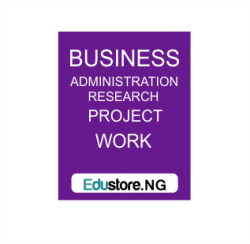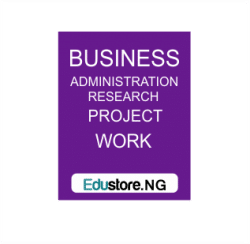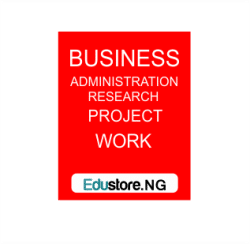Financial Inclusion and Loans Accessibility by the SMEs in Ekiti State
Abstract
The purpose of this quantitative survey study was to investigate the dynamics of loan accessibility and financial inclusion for small and medium-sized businesses (SMEs) in Nigeria’s Ekiti State. A structured questionnaire was utilised in the study to collect data from 120 respondents who were selected to represent the owners and managers of SMEs in the area. A suitable sample strategy was chosen since it was a realistic way to contact participants and would not pose any difficulties in reaching SME owners and managers. The survey instrument collected quantitative data on loan accessibility, financial inclusion, and related characteristics through the use of both closed-ended and Likert scale questions. Data analysis was conducted using SPSS27, a widely used statistical software for quantitative data analysis. The software facilitated efficient data processing, exploration, and statistical testing, aligning with the study’s quantitative nature. The one-sample t-test was employed to test hypotheses related to the relationship between financial inclusion, loan accessibility, and external economic factors influencing SMEs in Ekiti State. The findings revealed insights into the state of financial inclusion, the challenges faced by SMEs in accessing loans, and the influence of various factors on their financial landscape. Specifically, it was identified that SMEs face significant barriers in integrating into the formal financial system, and limited availability of collateral-free loan options hinders their access to financing. The study also indicated that high interest rates on loans and stringent eligibility criteria pose obstacles for SMEs seeking financial assistance. The study underscores the importance of tailored interventions and policy measures to enhance financial inclusion and support the sustainable growth of SMEs in the region. These findings have practical implications for policymakers, financial institutions, and other stakeholders involved in promoting SME development and fostering a conducive financial environment in Ekiti State.
CHAPTER ONE
INTRODUCTION
Background to the Study
Financial inclusion plays a pivotal role in fostering economic development, particularly within the realm of Small and Medium Enterprises (SMEs) (Abbasi, Wang, & Abbasi, 2017). The significance of this issue is highlighted in the context of Ekiti State, Nigeria, where the concern over financial inclusion and loan accessibility for SMEs has gained prominence (Okuneye & Ogunmuyiwa, 2022). As a predominantly agrarian state with a burgeoning entrepreneurial spirit, Ekiti State requires robust financial structures to underpin the growth and sustainability of SMEs (Abbasi et al., 2017). The success and prosperity of SMEs significantly contribute to the overall economic health of a region (Adelekan, Eze, & Majekodunmi, 2019).
Despite the strides made in SME development over the years, Ekiti State faces persistent challenges in providing accessible loans to these enterprises (Okuneye & Ogunmuyiwa, 2022). The European Journal of Business and Management study by Okuneye and Ogunmuyiwa (2022) sheds light on these challenges, indicating that factors determining SME development are intrinsically linked to the availability and accessibility of financial resources. This assertion is reinforced by the findings of Anokwuru and Wike (2021), who emphasize the crucial role financing plays in the economic development of Nigeria.
An essential aspect of this discussion is the evolving financial landscape and the increasing importance of inclusive financial systems (Bakhtiari et al., 2020). Biliqees Abdulmumin et al. (2023) contribute to this narrative by investigating the level of financial inclusion in Sub-Saharan Africa. Their findings are crucial in emphasizing the importance of comprehensive financial inclusion strategies to cater to the diverse needs of SMEs in the region.
In this context, the study becomes imperative to explore the intricate dynamics of financial inclusion and loan accessibility for SMEs in Ekiti State. The Central Bank of Nigeria (CBN) has recognized the pivotal role SMEs play in the economic landscape, as evidenced by the guidelines for SME credit guarantee (CBN, 2018). This institutional acknowledgement underscores the broader significance of understanding and addressing the challenges faced by SMEs in Ekiti State (Eigbiremolen & Igberaese, 2020). As the study delves deeper into the challenges faced by SMEs in accessing loans in Ekiti State, the work of Gbandi and Amissah (2022) becomes relevant. Their exploration of financing options for SMEs in Nigeria offers a nuanced perspective on the multifaceted challenges confronted by these enterprises. Additionally, the work of Gulani and Usman (2018) sheds light on the challenges faced by SMEs in Gombe State, emphasizing the broader national issue of financing small and medium-scale enterprises.
The concept of financial literacy emerges as a crucial factor in enhancing financial inclusion for SMEs. Ifeakachukwu and Olasunkanmi (2023) demonstrate the impact of banks’ loans to SMEs on manufacturing output in Nigeria, emphasizing the need for targeted financial literacy programs. Ikon and Chukwu (2018) further support this idea, emphasizing the importance of small and medium-scale enterprises’ role in industrial growth in Nigeria.
Statement of Problem
The issue of financial inclusion and loan accessibility for Small and Medium Enterprises (SMEs) in Ekiti State, Nigeria, poses significant challenges that warrant in-depth exploration. While studies such as those by Okuneye and Ogunmuyiwa (2022) and Anokwuru and Wike (2021) have touched upon the broader concerns in SME development and financing in Nigeria, there remains a critical gap in understanding the specific barriers faced by SMEs in Ekiti State. The existing research provides a foundation, but a more focused investigation is needed to uncover the nuanced challenges unique to this region.
Ekiti State, being predominantly agrarian with a growing entrepreneurial spirit, necessitates a more granular analysis of the financial impediments faced by SMEs (Abbasi et al., 2017). The existing literature acknowledges the importance of inclusive financial systems (Bakhtiari et al., 2020), but there is a lack of detailed examination into the nature and extent of these systems in Ekiti State. This research aims to address this gap by providing insights into the specific financial inclusion landscape in the state, identifying the hurdles faced by SMEs in accessing loans and proposing targeted solutions.
Moreover, while the Central Bank of Nigeria (CBN) has recognized the significance of SMEs and issued guidelines for SME credit guarantees (CBN, 2018), there is a lack of empirical evidence on the practical implications and effectiveness of these guidelines in Ekiti State. Understanding the alignment of policies with ground-level realities is crucial for devising interventions that resonate with the unique characteristics of the state’s SME sector (Eigbiremolen & Igberaese, 2020). This study seeks to bridge this gap by evaluating the practical impact of existing policies on the ground and suggesting refinements or additional measures as necessary.
Furthermore, the concept of financial literacy as a critical determinant of SME success (Ifeakachukwu & Olasunkanmi, 2023) requires a more detailed examination within the context of Ekiti State. The existing literature emphasizes the importance of financial literacy programs, but their specific impact on SMEs in Ekiti State is yet to be thoroughly investigated. This research aims to contribute by assessing the current level of financial literacy among SME owners in Ekiti State and proposing targeted strategies to enhance financial education.
Objectives of the Study
The specific objectives are as follows:
- To assess the current state of financial inclusion for SMEs in Ekiti State.
- To identify the specific challenges hindering loan accessibility for SMEs in the sinclude
- To propose practical solutions to enhance financial inclusion and improve loan accessibility for SMEs in Ekiti State.
Research Questions
To guide the study effectively, the following research questions have been formulated:
- What is the current level of financial inclusion for SMEs in Ekiti State?
- What are thaccess challenges faced by SMEs in accessing loans in Ekiti State?
- What practical solutions can be implemented to improve financial inclusion and loan accessibility for SMEs in Ekiti State?
Research Hypotheses
The study tested the following hypotheses:
Null Hypotheses(H0):
- There is no significant relationship between the level of financial inclusion and the success of SMEs in Ekiti State.
- The challenges faced by SMEs in accessing loans in Ekiti State are not influenced by external economic factors.
- Implementing targeted financial literacy programs will negatively impact the financial inclusion of SMEs in Ekiti State.
Alternative Hypotheses(H1):
- There is a significant relationship between the level of financial inclusion and the success of SMEs in Ekiti State.
- The challenges faced by SMEs in accessing loans in Ekiti State are influenced by external economic factors.
- Implementing targeted financial literacy programs will positively impact the financial inclusion of SMEs in Ekiti State.
Significance of the Study
This study holds immense significance for various stakeholders in Ekiti State, including policymakers, financial institutions, SME owners, and the general population. Understanding the dynamics of financial inclusion and loan accessibility for SMEs is crucial for designing effective policies and strategies to promote economic growth. Policymakers can use the findings to develop tailored interventions, financial institutions can refine their offerings, and SME owners can adapt their strategies based on a comprehensive understanding of the challenges and opportunities in the financial landscape.
Scope of the Study
The study focuses on the financial inclusion and loan accessibility of SMEs in Ekiti State, Nigeria. The research covers a specific time frame, taking into account historical data and recent developments up to the present date. The geographical scope is limited to Ekiti State, recognizing the unique economic and social context of the region.
REFERENCES
- The World Bank Report (2018). The Role of Non-Bank Financial Intermediaries both Financial Intermediaries; Policy research working paper.
- Umar, B. & Tahir, H.M. (2022). The role of trade openness and oil price on the exchange rate: ARDL bound testing evidence from Nigeria. Journal of Economics and Sustainable Development, 7(16), 153-161.
- Wang, D.S. (2019). Association between technological innovation and firm performance in small and medium-sized enterprises: the moderating effect of environmental factors. International Journal of Innovation Science, 11(2), 227-240.
- Yahaya, Y. (2021). Financing, small and medium-scale enterprises for sustainable growth and development in Nigeria: A case study of Zada, Kaduna State. Journal of Economics and Sustainable Development, 6(14), 137-146.
- Yin, R. K. (2018). Case Study Research and Applications: Designs and Methods. 6th edition. Los Angeles: Sage Publications
- For Reference Only: Materials are for research, citation, and idea generation purposes and not for submission as your original final year project work.
- Avoid Plagiarism: Do not copy or submit this content as your own project. Doing so may result in academic consequences.
- Use as a Framework: This complete project research material should guide the development of your own final year project work.
- Academic Access: This platform is designed to reduce the stress of visiting school libraries by providing easy access to research materials.
- Institutional Support: Tertiary institutions encourage the review of previous academic works such as journals and theses.
- Open Education: The site is maintained through paid subscriptions to continue offering open access educational resources.






